Imagine: Your AE’s demo crashes during a C-suite presentation and prospects disengage during screen-sharing because they can’t touch your product.
Gartner says B2B buyers spend only 17% of their journey with suppliers. The other 83% is independent research and hands-on evaluation and yet most SaaS companies still use static presentations while competitors offer interactive experiences.
Failed demos cost $47K in lost deals on average and sales cycles extend 34% without real product interaction. Teams waste hours on demo prep and maintenance for underwhelming experiences.
Today’s executives want to use your product, not just see it. They expect personalized scenarios with real data and immediate access.
Live demos eliminate this entire problem.
Prospects can access your full product with real data without security risks or crashes. Live demos use synthetic data embedded into real product instances, not staging environments that expose systems.
Interactive experiences with full functionality speed up decisions and build buyer confidence.
The market demands authentic evaluation. Your demo strategy must adapt.
In this guide:
- Live demo basics and how they differ from other approaches
- Strategic use cases across teams with deployment strategies for maximum impact
- Step-by-step implementation guide for measurable results
What are live demos
Live demos are product instances with synthetic data that let prospects experience full functionality interactively. They have authentic interfaces with realistic scenarios and eliminate security risks through automated data management.
Unlike other demo approaches, live demos are:
- Fully functional with all features working as they would in production, including AI features
- Data realistic with synthetic content that mirrors real business scenarios
- Automated through browser automation and scripted simulation
- Instantly customizable with templates for different industries
- Analytics enabled with buyer engagement tracking
- Always up to date through continuous automated maintenance
They support prospects throughout their evaluation journey while providing sales teams with embedded guidance and insights.
Live demos vs. other demo approaches: understanding the differences
With 73% of B2B buyers now comparing 3+ demo approaches before making software decisions, choosing the right demo strategy directly impacts your win rate. Here’s how the three main approaches stack up:
Choose live demo when: You need to prove complex functionality, accelerate enterprise deals or provide authentic evaluation experiences that generate qualified pipeline.
Choose sandboxes when: Prospects want to get hands-on and you can accept limited workflow scope for interactive engagement.
Choose interactive demos when: You need feature education, have simple products or want to make sure every prospect sees the same carefully crafted story.
Companies closing $500K+ deals choose live demos because authentic experiences with realistic data eliminate buyer objections and accelerate decisions. Sandboxes work for mid-market technical validation. Interactive demos excel for product education and marketing qualified lead nurturing.
Why live demos matter now
We’re in the era of real product evaluation. Buyers want to see real experiences that demonstrate actual capabilities, not simplified versions that leave questions unanswered. They want to see how your product handles their industry scenarios, data complexity and workflow requirements.
Traditional demo approaches create significant limitations. Static presentations can’t demonstrate dynamic features or complex workflows. Separate staging environments expose security risks and require constant maintenance from engineering teams. UI simulations look realistic but can’t showcase advanced features like AI or complex integrations.Live demos solve these problems with synthetic data that creates realistic scenarios without security risks. Automated activity simulation keeps the environment fresh while browser automation ensures all features work. This eliminates the “demo disconnect” where prospects see simplified versions that don’t match real world usage.
The shift to authentic evaluation is part of broader market changes. Remote selling requires more advanced demonstration capabilities. Buyers do extensive research before engaging with vendors. Decision making involves larger committees that need consistent experiences across multiple touchpoints.
For go-to-market teams under pressure to deliver faster sales cycles with fewer resources, live demos scale authentic experiences without engineering dependencies or maintenance requirements. They provide the sophistication buyers expect while giving sellers the tools and insights to accelerate deals.
Metrics that matter: how live demos impact growth
Live demos deliver measurable improvements across the entire customer lifecycle by providing authentic experiences that drive engagement and accelerate decisions.
When to use live demos: 10 high-impact scenarios
Live demos deliver measurable results across the entire customer journey by providing authentic experiences that drive engagement and accelerate decisions.
- Sales presentations requiring full functionality - Show complex features and AI capabilities that simplified demos can’t
- Proof of concept delivery with realistic scenarios - Validate product capabilities using industry data without implementation overhead
- Multi-stakeholder buyer committee alignment - Provide consistent experiences across distributed decision-makers with embedded guidance
- Competitive differentiation through authentic comparison - Show real product advantages using believable scenarios and full functionality
- Customer onboarding acceleration with realistic training - Reduce time-to-value using familiar data patterns and full feature access
- Sales team enablement at scale - Ensure consistent demos across global teams with embedded scripts and guidance
- Marketing lead qualification through engagement analytics - Identify high intent prospects based on feature interaction patterns
- Website conversion and self-service evaluation - Allow immediate product exploration without registration barriers or security concerns
- Partner and channel training with automated maintenance - Enable effective demos without technical support requirements
- Customer expansion conversations with advanced feature demonstration - Show premium features and tier upgrades using realistic upgrade scenarios
Practical use cases for live demos
Live demos create compounding value across the entire customer lifecycle by delivering authentic experiences that drive engagement, accelerate decisions, and generate actionable insights for sales optimization.
Use case 1: Website conversion with authentic product experiences
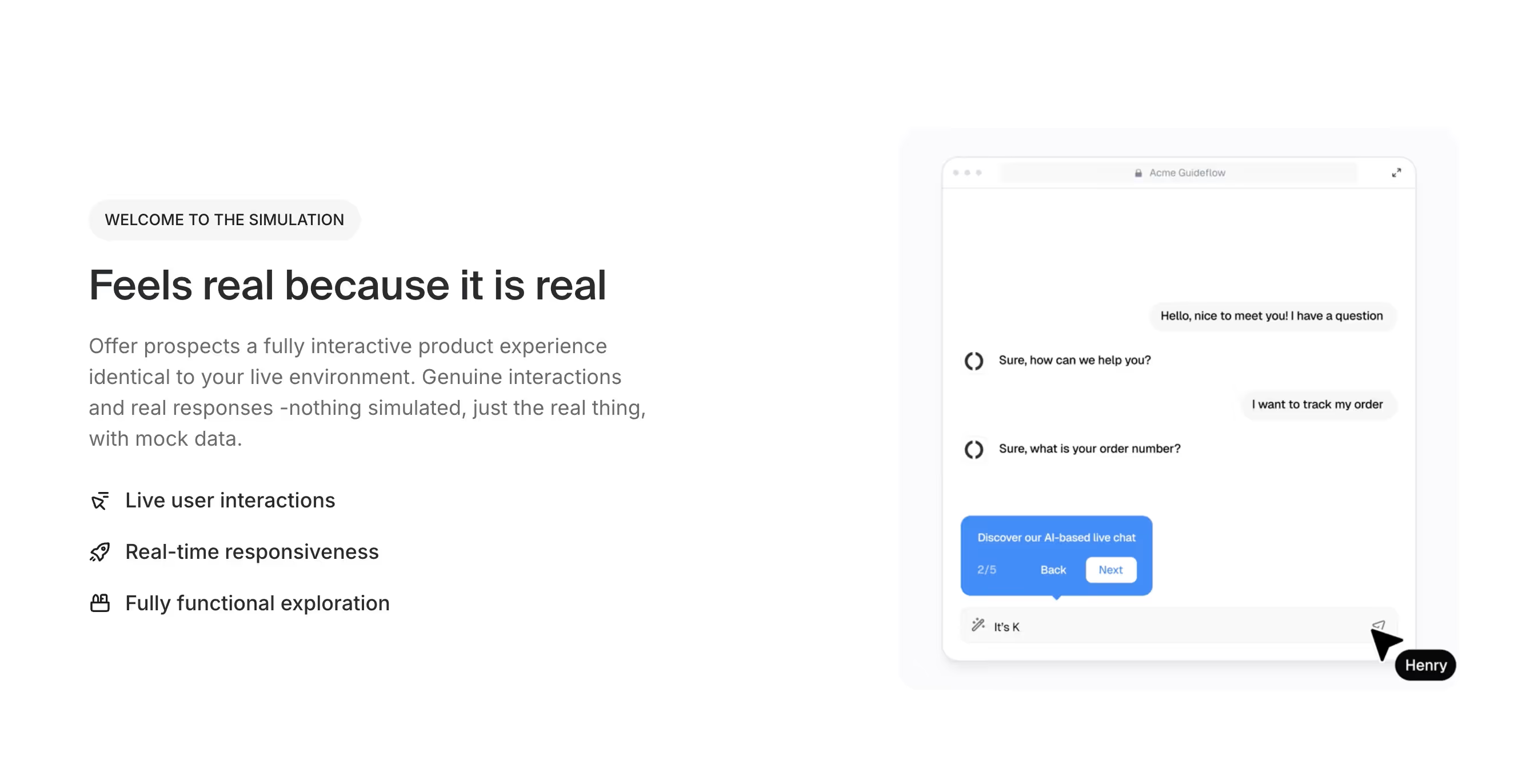
Challenge
Website visitors struggle to understand product value through static presentations, generic screenshots, or simplified feature lists. Modern buyers want immediate access to authentic product experiences without lengthy registration processes or security reviews. Traditional approaches either oversimplify the product or create barriers that reduce conversion rates.
Solution
Deploy live demos directly on high-intent website pages where visitors can experience complete product functionality using realistic, industry-specific synthetic data. Prospects explore authentic workflows, test advanced features, and understand value propositions through hands-on interaction rather than passive consumption.
Benefits
- Eliminates registration barriers while providing authentic product experiences
- Generates detailed engagement analytics that identify high-intent prospects
- Demonstrates complex features and AI capabilities that static content cannot show
- Creates personalized experiences using industry-specific data templates
- Provides immediate gratification for buyers seeking hands-on evaluation
- Reduces bounce rates through engaging, interactive content that maintains attention
When to use
- On product pages where complex functionality requires demonstration rather than description
- In paid campaign landing pages to maximize conversion ROI through authentic engagement
- For competitive positioning pages where differentiation requires hands-on comparison
- During website optimization experiments testing interactive vs. static content performance
Pro tip: Use custom data templates that match your target audience's industry and use case. Prospects engage 73% longer with scenarios that reflect their business context.
Use case 2: Sales presentations with guaranteed functionality and embedded guidance
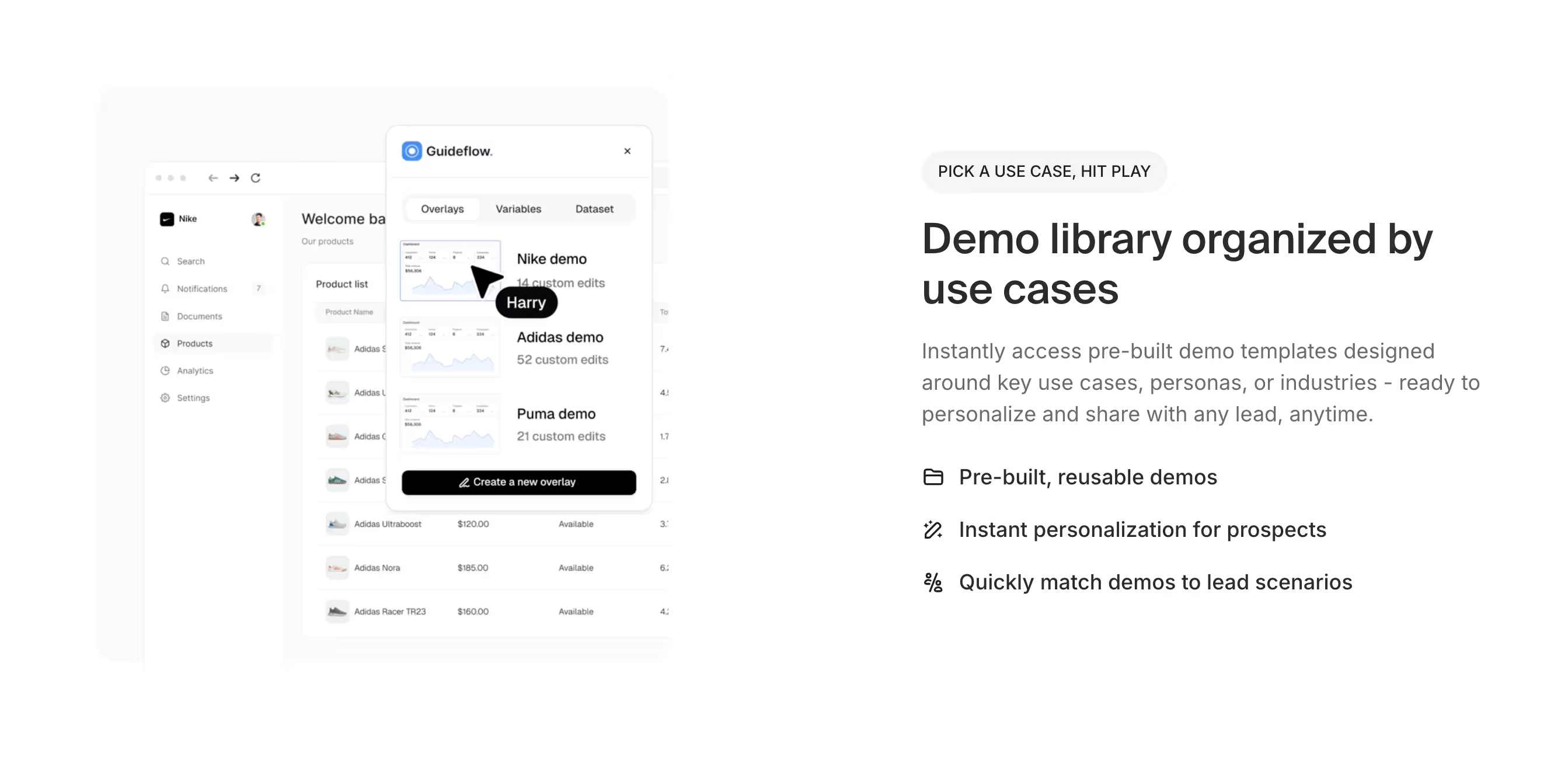
Challenge
Sales teams struggle with inconsistent demo delivery, complex feature explanation, and technical failures during critical presentations. Traditional staging environments create security risks and maintenance overhead while simplified demos fail to demonstrate advanced capabilities that differentiate your product.
Solution
Equip sales teams with live demos that include embedded guidance, talking points, and realistic scenarios tailored to specific buyer contexts. Complete product functionality works naturally while automated maintenance ensures consistent availability without technical dependencies.
Benefits
- Eliminates technical demo failures through automated environment maintenance
- Ensures consistent value demonstration across all team members with embedded guidance
- Demonstrates complete product functionality including AI and advanced features
- Provides realistic scenarios that help prospects visualize implementation
- Generates detailed buyer engagement data for optimized follow-up conversations
- Reduces preparation time while improving demonstration quality and effectiveness
When to use
- During enterprise sales presentations where complex functionality must be demonstrated
- With new sales team members who need consistent guidance and messaging
- In competitive situations where product differentiation requires authentic comparison
- For high-value deals where demonstration quality directly impacts close rates
Pro tip: Customize data templates and embedded guidance for different buyer personas and industries. Sales reps using personalized environments see 47% higher demo-to-meeting conversion rates.
Use case 3: Proof of concept delivery with realistic validation scenarios
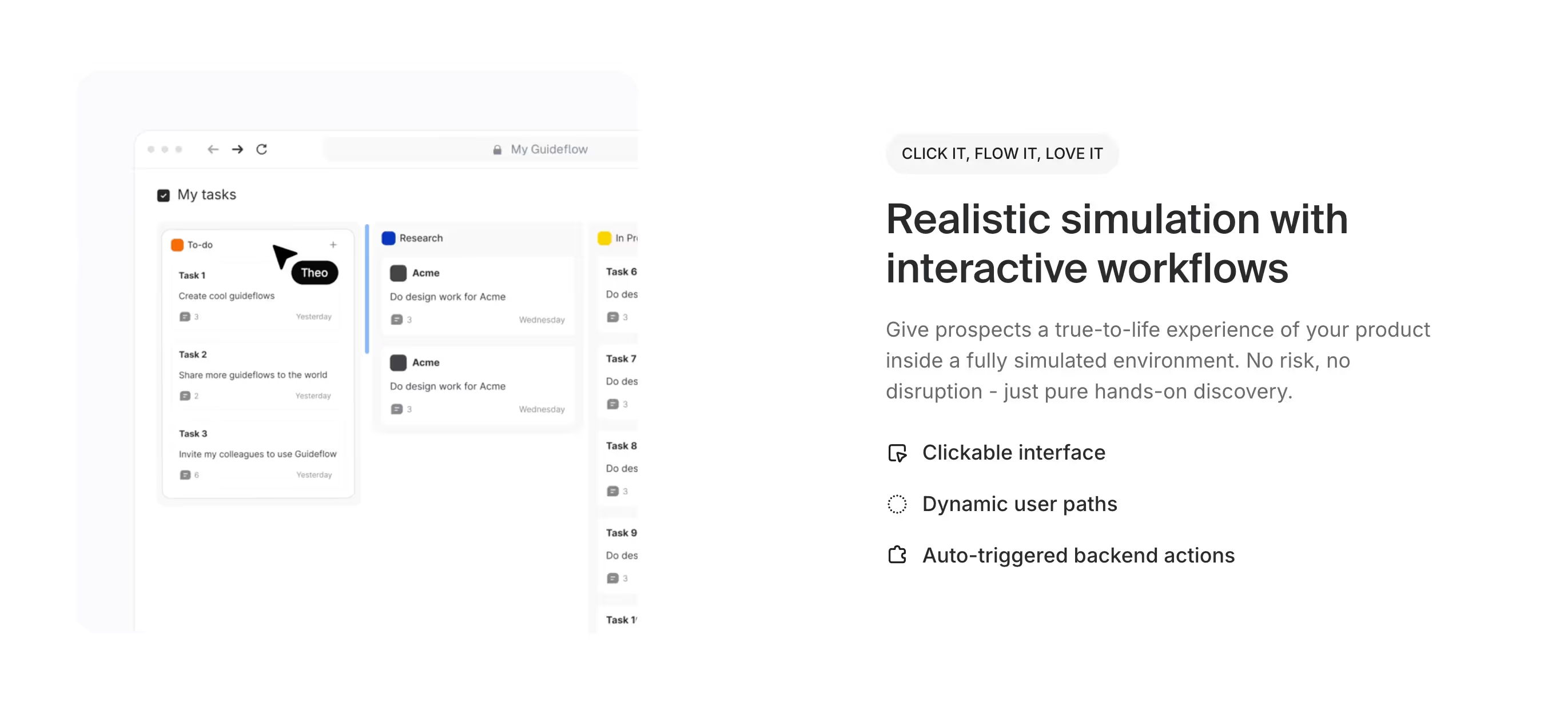
Challenge
Traditional proof of concept processes require extensive setup, expose production systems to risk, and often fail because prospects cannot configure realistic scenarios that match their actual requirements. Long setup cycles delay evaluation while prospects lose momentum and decision-making urgency.
Solution
Provide instant proof of concept environments using synthetic data that reflects realistic business scenarios, complex workflows, and integration requirements. Prospects validate product capabilities using familiar data patterns while avoiding security concerns and implementation delays.
Benefits
- Eliminates setup delays and technical barriers that slow proof of concept timelines
- Demonstrates realistic product performance using complex, authentic data scenarios
- Validates integration capabilities and custom configurations without security risks
- Provides instant access to advanced features that traditional POCs cannot safely demonstrate
- Generates engagement analytics that reveal specific areas of prospect interest and concern
- Accelerates deal progression by removing technical obstacles and security reviews
When to use
- When prospects require technical validation before final purchase decisions
- For complex products where simplified demos cannot demonstrate real capabilities
- With security-conscious prospects who cannot accept traditional staging environment risks
- During competitive evaluations where authentic comparison requires realistic scenarios
Pro tip: Create POC environments using data patterns that closely match your prospect's industry and scale. Prospects using familiar data scenarios show 68% higher validation success rates.
Use case 4: Customer onboarding acceleration with realistic training environments
Challenge
Customer onboarding often struggles with artificial training scenarios that don't reflect real usage patterns. New users need hands-on experience with realistic data to understand product capabilities, but traditional training approaches use simplified examples that don't prepare customers for actual implementation.
Solution
Deploy live demos with synthetic data that mirrors realistic business scenarios for hands-on customer training. New users explore complete functionality using familiar data patterns while customer success teams track engagement to identify areas requiring additional support.
Benefits
- Accelerates time-to-value through realistic, hands-on training experiences
- Reduces support ticket volume by providing comprehensive feature exploration
- Identifies customer engagement patterns that predict successful adoption
- Enables self-paced learning using familiar industry data and workflow patterns
- Provides customer success teams with detailed insights for optimization
- Creates confidence through authentic product experience before live implementation
When to use
- During new customer onboarding to accelerate product adoption and value realization
- For complex products requiring extensive user training and feature familiarization
- With customers who need validation before full implementation and data migration
- When customer success teams need detailed insights into user engagement patterns
Pro tip: Use onboarding environments that gradually introduce complexity, starting with basic workflows and advancing to sophisticated use cases. Customers using progressive training show 54% faster adoption rates.
Use case 5: Sales team enablement with consistent guidance and messaging
Challenge
Sales teams struggle with inconsistent product demonstrations, complex feature explanation, and varying message delivery across team members. Traditional training approaches fail to ensure consistent value demonstration while complex products require ongoing education and support.
Solution
Implement live demos with embedded seller guidance, talking points, and standardized messaging that ensures consistent demonstrations across all team members. Automated maintenance eliminates technical preparation while comprehensive analytics provide coaching insights.
Benefits
- Standardizes product demonstrations across global teams and experience levels
- Reduces ramp-up time for new sales team members through embedded guidance
- Eliminates technical preparation and maintenance overhead for sales representatives
- Provides coaching insights through detailed demonstration analytics and engagement patterns
- Ensures consistent messaging and value proposition delivery regardless of team member
- Accelerates sales productivity by removing technical barriers and preparation requirements
When to use
- When onboarding new sales team members who need consistent product knowledge
- For complex products requiring standardized explanation and value demonstration
- Across distributed teams where consistent messaging and quality matter
- During product updates or positioning changes that require uniform communication
Pro tip: Include persona-specific guidance and talking points within environments. Sales teams using embedded guidance show 41% more consistent messaging and 29% higher close rates.
Key features and benefits of live demos
Modern live demos combine sophisticated synthetic data with real product functionality to create authentic experiences that drive engagement and accelerate sales cycles.
Automated product cloning and replication
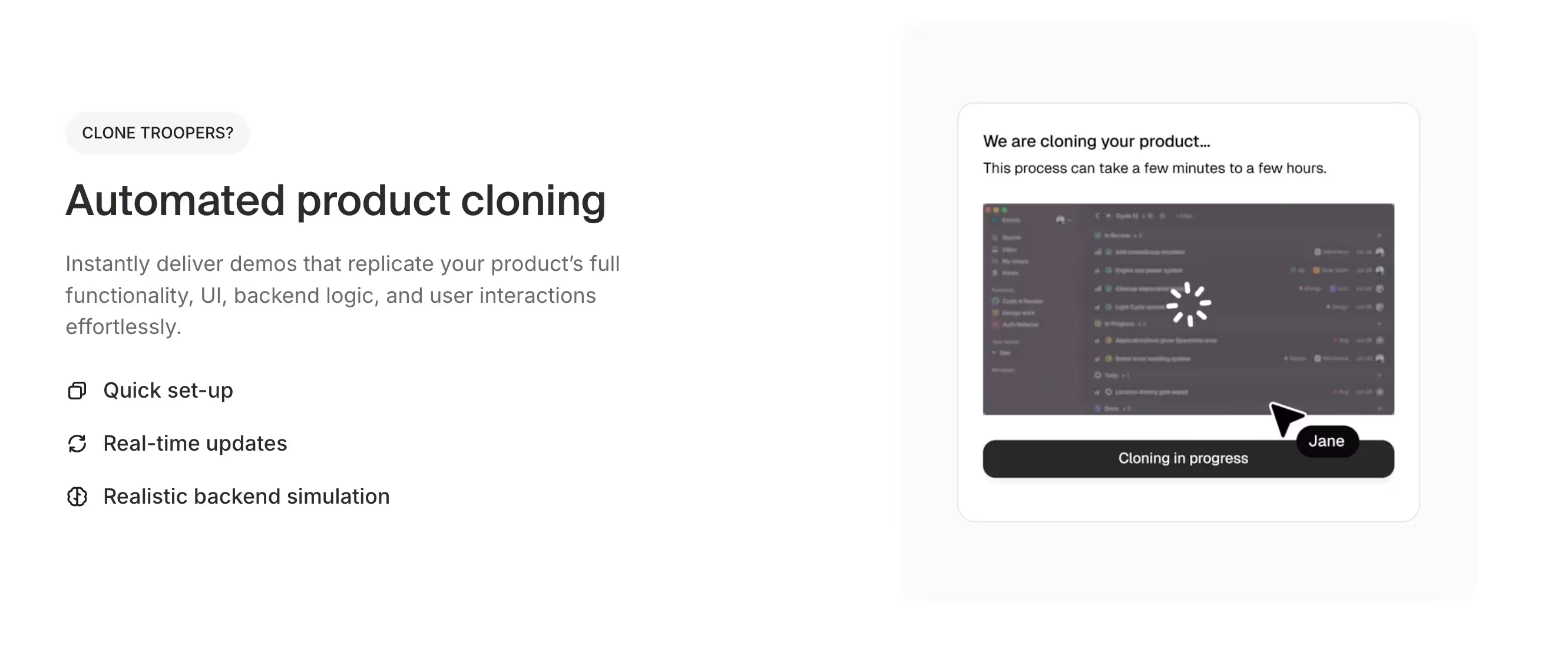
Instantly replicate your product's complete functionality, UI, backend logic, and user interactions without any coding or development resources. The system captures your entire product architecture and creates pixel-perfect demonstrations that feel identical to your live environment.
Benefits
- Quick setup process eliminates weeks of manual demo environment creation
- Real-time updates keep demos synchronized with product changes automatically
- Results in 61% faster follow-up from sales and 83% longer prospect engagement sessions
- Delivers 2.7x faster "aha moments" compared to traditional demo approaches
This automated approach differentiates from manual staging environments by eliminating development bottlenecks while maintaining complete product authenticity.
Real-time backend replication via proxy
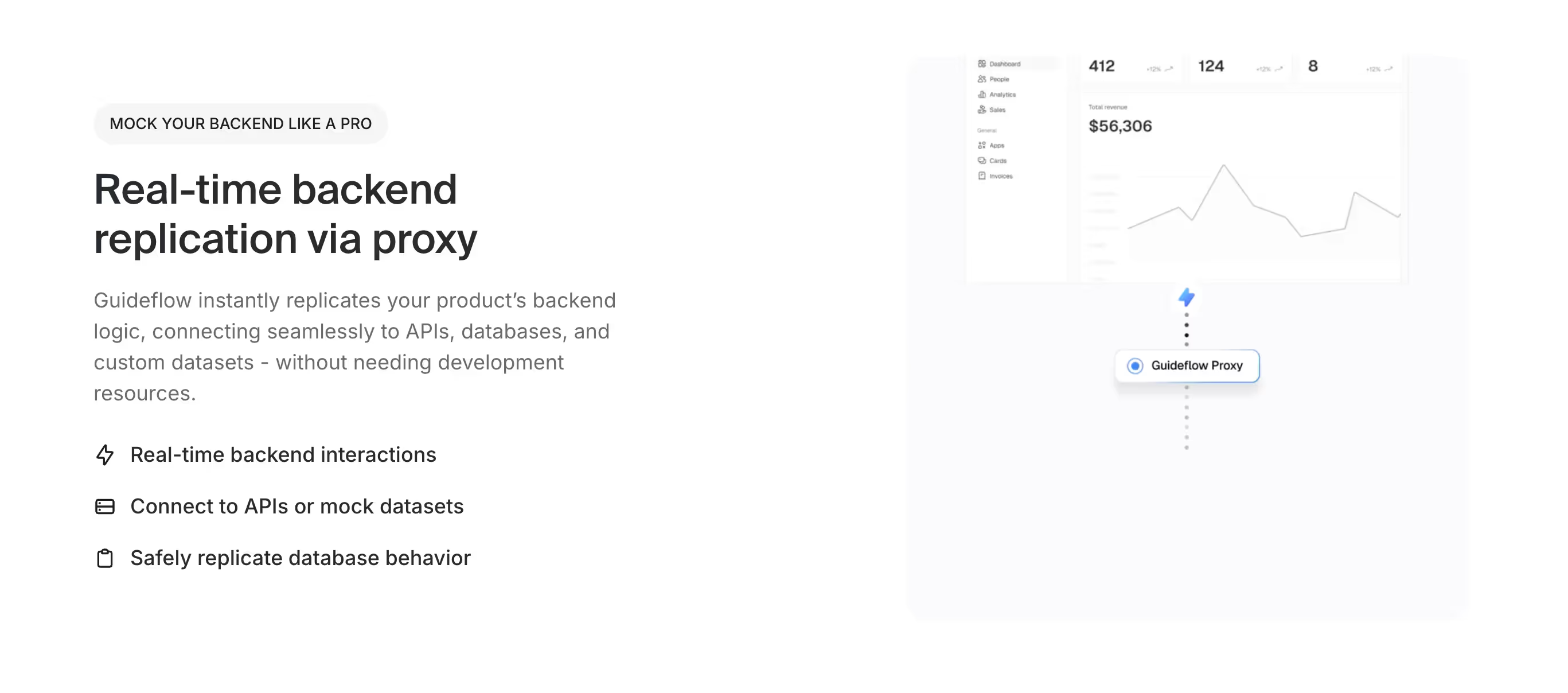
Seamlessly connect to APIs, databases, and custom datasets to deliver realistic backend responses and data interactions. The system safely replicates database behavior while maintaining complete isolation from production systems.
Benefits
- Demonstrates complex integrations and data flows without security risks
- Provides authentic API responses that validate technical capabilities
- Eliminates the need for separate staging infrastructure or ongoing maintenance
- Supports both live data connections and mock datasets for maximum flexibility
Unlike simplified simulations, this technology provides genuine backend interactions that technical buyers can evaluate and trust.
Dynamic environment resets and session management
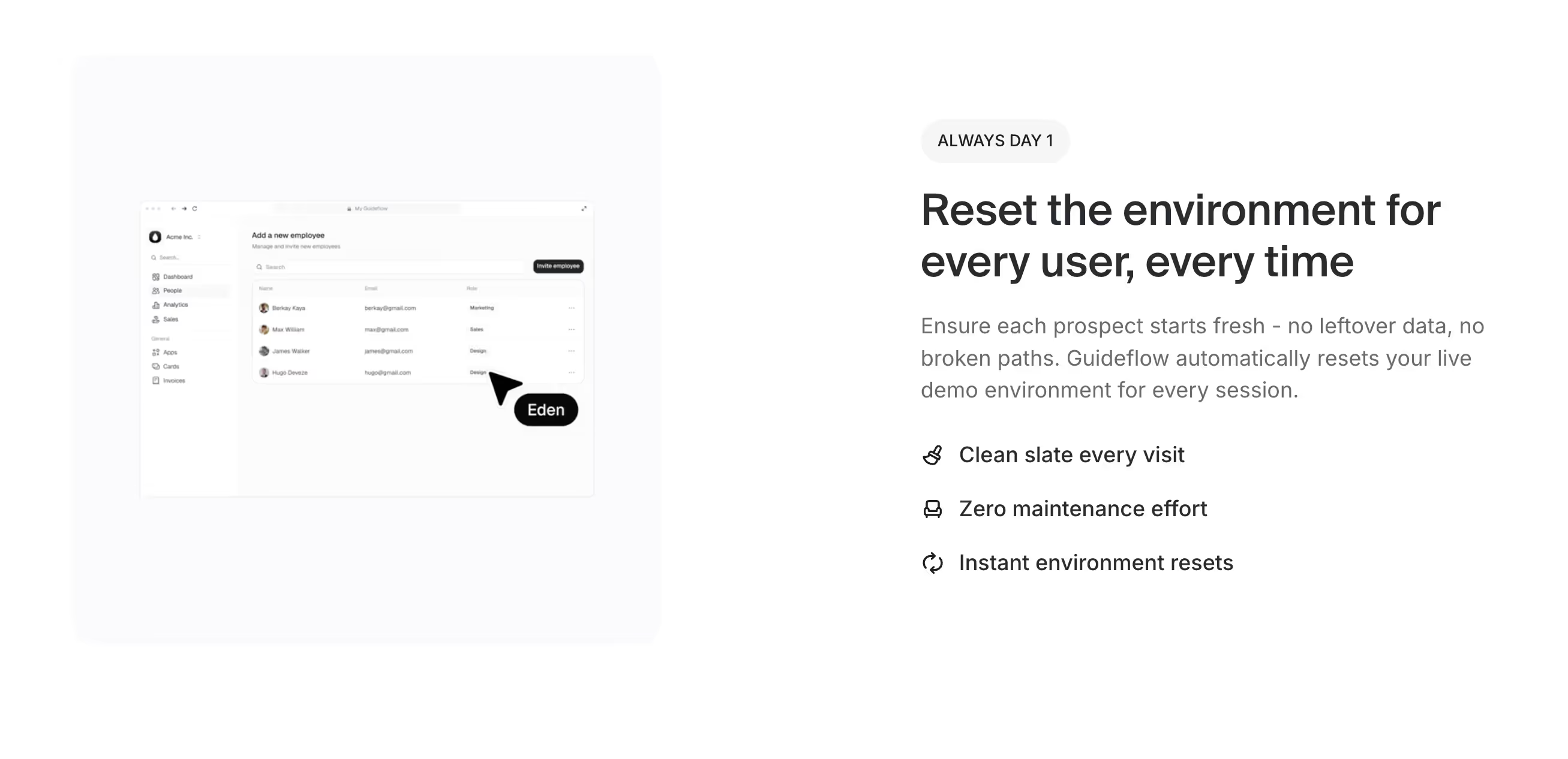
Automatically reset the demo environment for every user session, ensuring each prospect starts with a clean slate and optimal experience. No leftover data, broken workflows, or inconsistent states compromise the demonstration quality.
Benefits
- Zero maintenance effort required from technical teams
- Instant environment resets eliminate demo preparation time
- Consistent experience quality regardless of previous user interactions
- Prevents demo failures caused by corrupted data or broken user flows
This automation differentiates from manual demo environments that require constant cleanup and preparation between sessions.
Real-time customization and personalization
Effortlessly adapt demos on-the-fly by editing text, images, charts, and dynamic content to deliver hyper-personalized experiences tailored to each prospect's industry, role, and specific requirements.
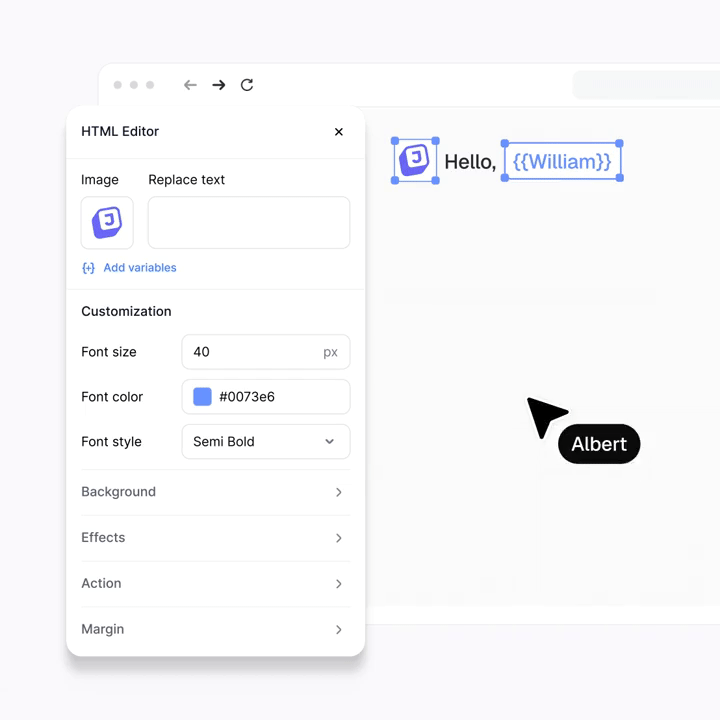
Benefits
- No coding or development help needed for instant customization
- Smart variables enable dynamic personalization of names, numbers, and content
- Industry-specific scenarios increase relevance and engagement
- Custom datasets can be imported via CSV or connected from live data sources
This flexibility enables sales teams to create relevant experiences without technical dependencies or lengthy preparation processes.
Organized demo library and template system
Access pre-built demo templates organized by use cases, personas, and industries that can be instantly personalized and shared with any prospect. The system enables quick matching of demos to specific lead scenarios.
Benefits
- Pre-built, reusable demo templates reduce creation time from hours to minutes
- Persona-specific views ensure relevant experiences for different stakeholder types
- Instant personalization capabilities adapt templates to individual prospect contexts
- Centralized library enables consistent experiences across global sales teams
This systematic approach ensures sales teams always have appropriate demonstration content readily available for any buyer scenario.
One-click sharing and embedding capabilities
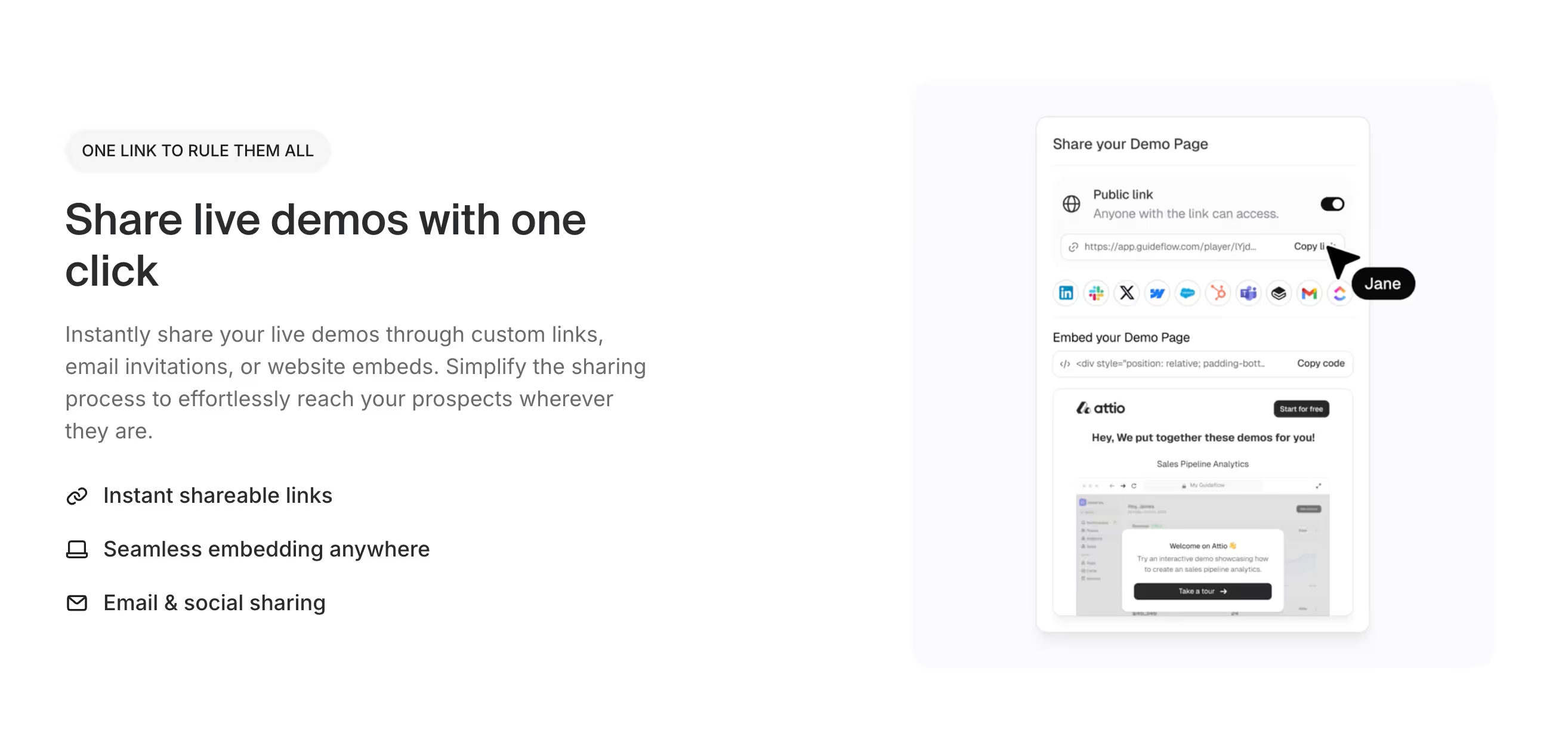
Instantly share live demos through custom links, email invitations, or seamless website embeds. The platform simplifies distribution to reach prospects wherever they engage with your content.
Benefits
- Instant shareable links eliminate friction in demo distribution
- Seamless embedding anywhere enables flexible deployment across marketing channels
- Email and social sharing options maximize reach and accessibility
- Custom link options provide control over demo access and permissions
This distribution flexibility enables both self-service prospect evaluation and guided sales presentations through the same technology platform.
Comprehensive analytics and intent tracking
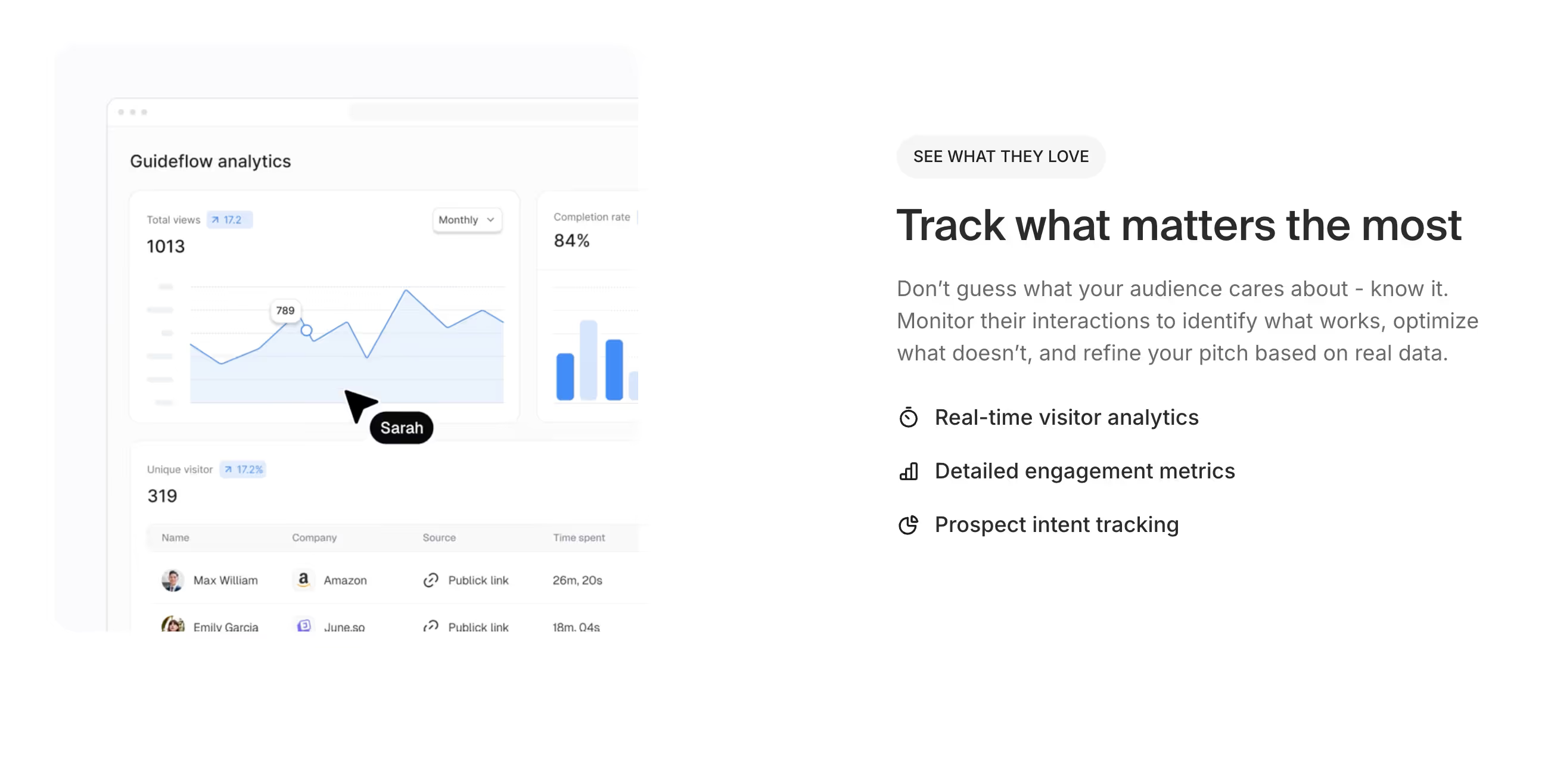
Monitor prospect interactions in real-time to identify engagement patterns, feature interests, and buying intent signals. The system provides detailed session data, user behavior insights, and engagement metrics for sales optimization.
Benefits
- Real-time visitor analytics reveal which features generate the most interest
- Detailed engagement metrics help prioritize follow-up conversations and messaging
- Prospect intent tracking identifies high-value opportunities for immediate outreach
- Session recordings provide insights for continuous demo improvement and personalization
This intelligence enables data-driven sales approaches that significantly improve conversion rates and deal progression speed.
Presenter notes and sales enablement
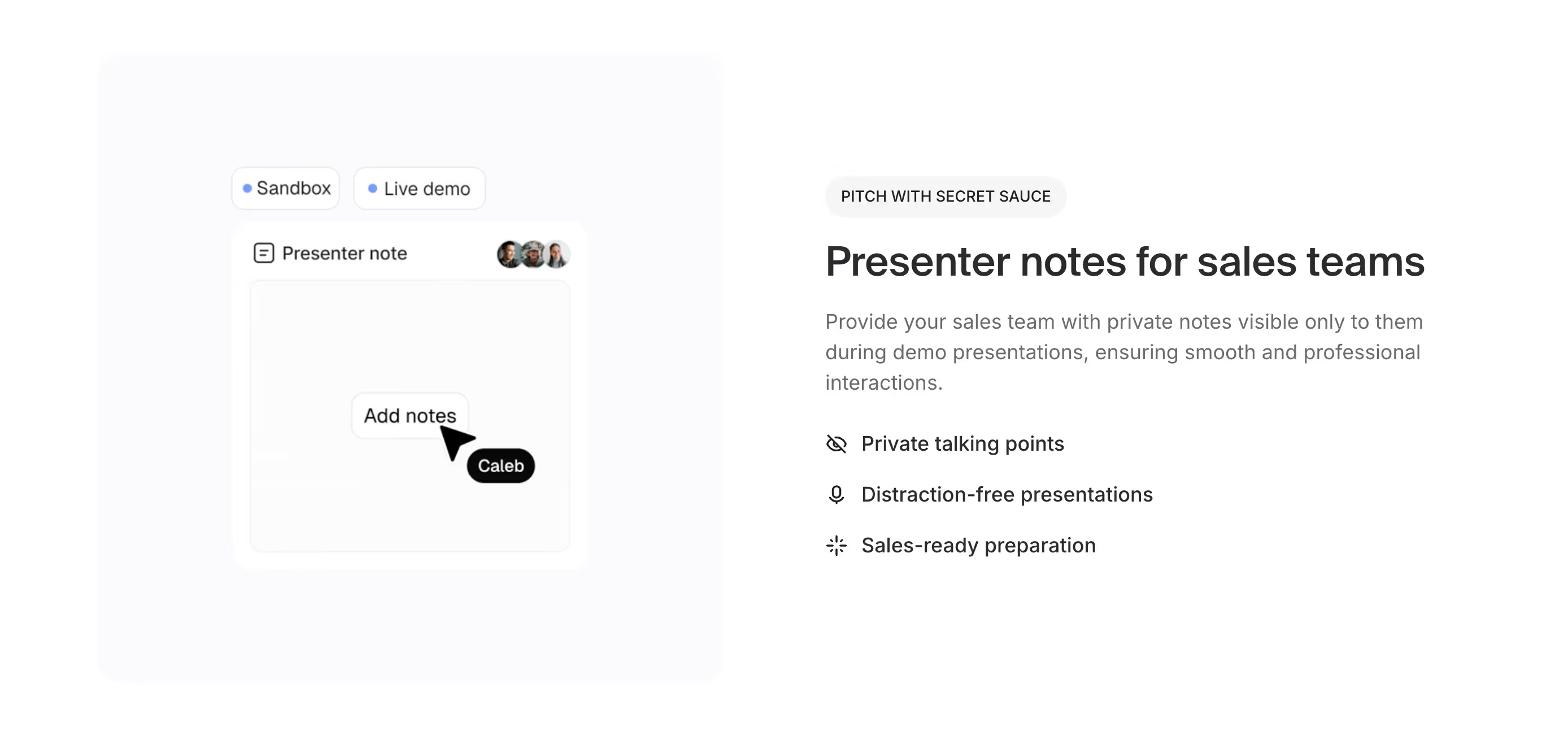
Provide sales teams with private notes visible only to them during demo presentations, ensuring smooth, professional interactions with consistent messaging and talking points.
Benefits
- Private talking points ensure consistent value demonstration across all team members
- Distraction-free presentations maintain prospect focus while providing seller guidance
- Sales-ready preparation reduces ramp-up time for new team members
- Embedded guidance improves demonstration quality regardless of presenter experience level
This built-in enablement ensures every demonstration delivers maximum impact while maintaining professional presentation standards.
Comprehensive integration ecosystem
Connect seamlessly with existing sales, marketing, and customer success tools to enable cross-functional collaboration and automated workflow management throughout the buyer journey.
Benefits
- Native integrations with CRM, marketing automation, and analytics platforms streamline data flow
- Automated lead scoring and qualification based on demo engagement patterns
- Cross-functional visibility enables coordinated prospect engagement strategies
- Workflow automation reduces manual tasks while improving response times
This integration capability ensures live demo environments enhance rather than complicate existing go-to-market technology investments.
Conclusion
Live demos represent the evolution of product demonstration technology, delivering authentic experiences that modern buyers expect while solving the technical and security challenges that limit traditional approaches.
By combining real product instances with AI-generated synthetic data, these environments provide complete functionality without security risks, automated maintenance without engineering overhead, and detailed buyer insights without privacy concerns. They scale sophisticated experiences across global teams while providing the consistency and analytics needed to accelerate deals.
Whether you're seeking to convert website traffic through authentic product experiences, enable sales teams with consistent demonstration capabilities, validate complex features through realistic proof of concept scenarios, or accelerate customer onboarding with hands-on training environments, live demos deliver measurable improvements in engagement, conversion, and deal progression.
The data speaks clearly: organizations using live demos see 89% reduction in maintenance overhead, 156% longer buyer engagement, 43% faster sales cycles, and 38% improvement in deal close rates. These results reflect the fundamental shift toward authentic evaluation experiences that sophisticated buyers now expect.
With comprehensive functionality, embedded seller guidance, automated maintenance, and detailed buyer analytics, live demos provide the sophistication needed to compete effectively while delivering the efficiency required to scale across growing organizations.
Start your live demos implementation today to deliver the authentic product experiences that accelerate deals and differentiate your solution in competitive markets.
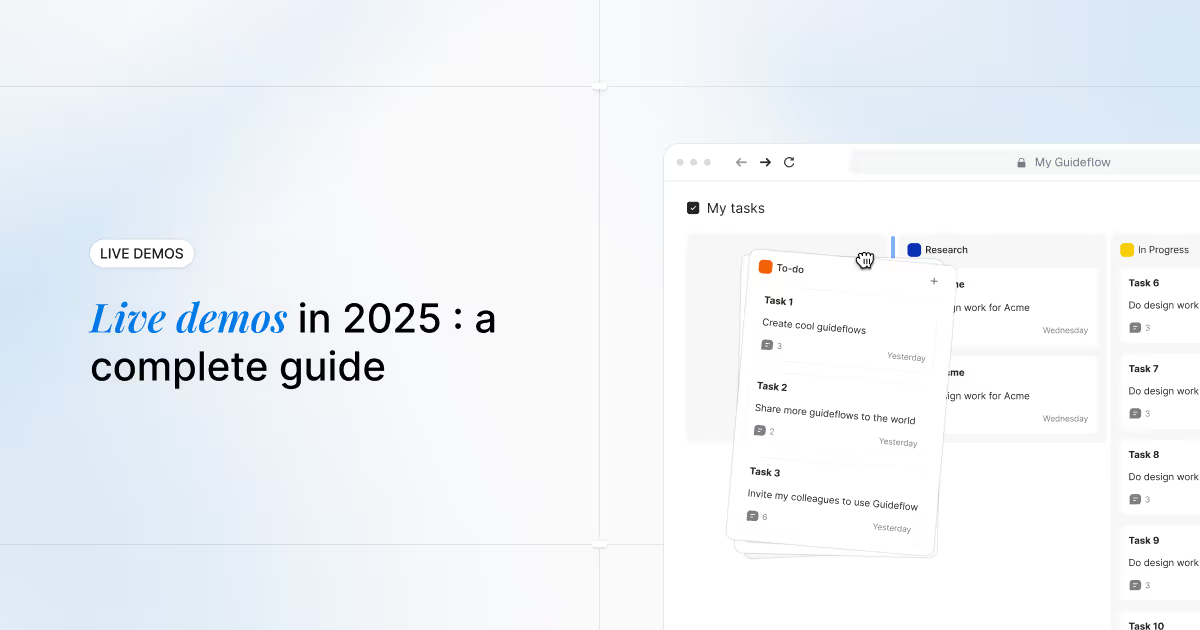

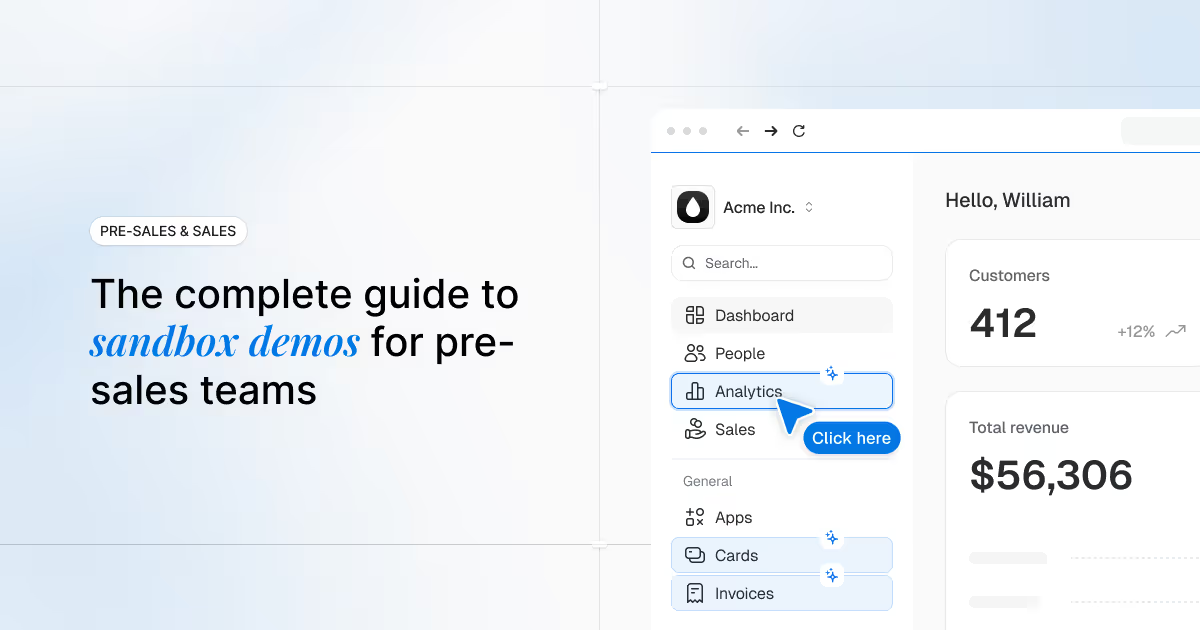


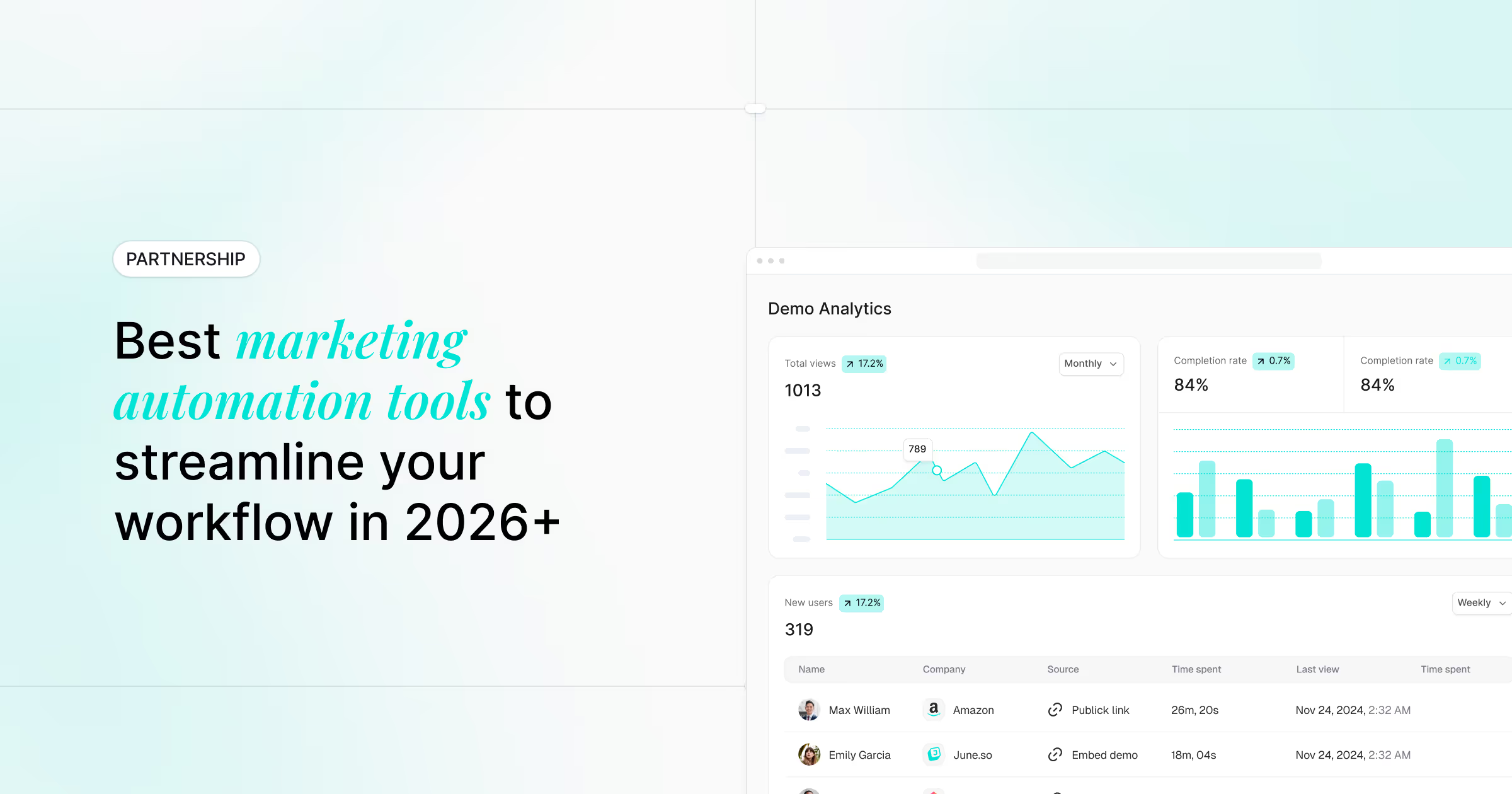
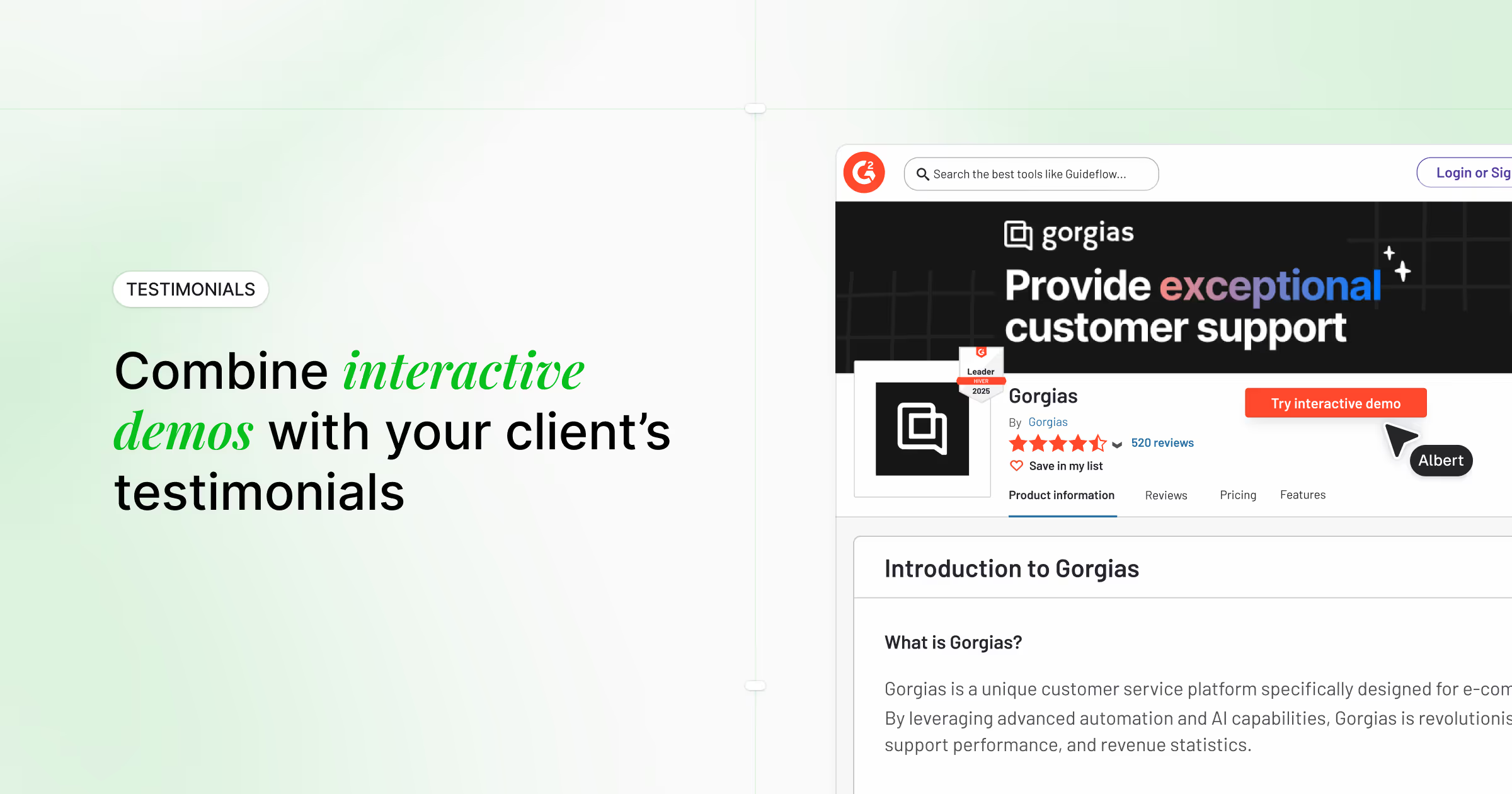
.avif)




